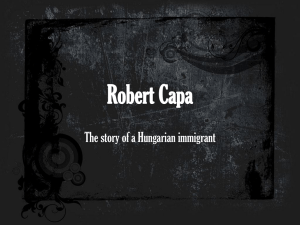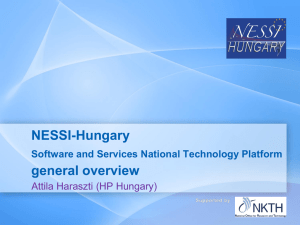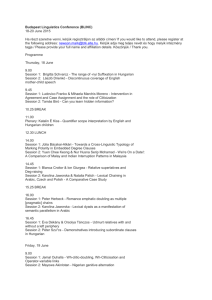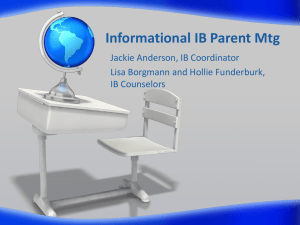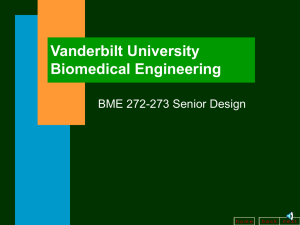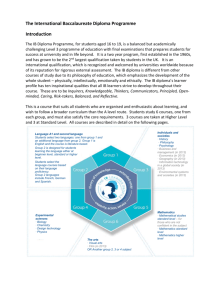What is the IB? - BUTE International Secondary Grammar School
advertisement
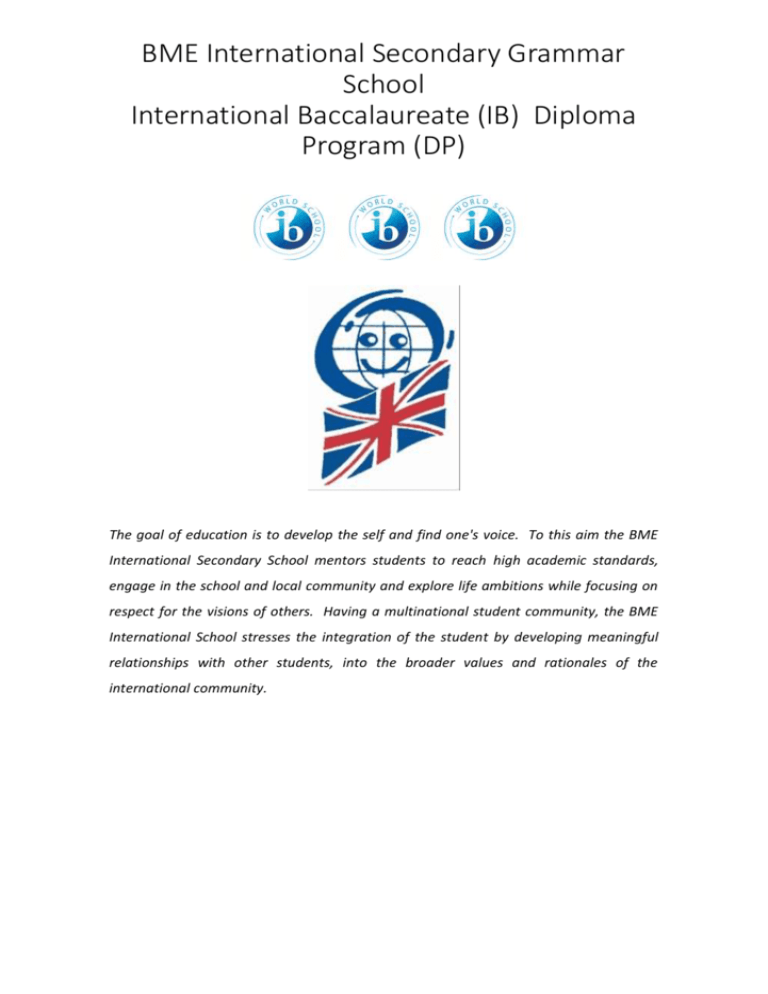
BME International Secondary Grammar School International Baccalaureate (IB) Diploma Program (DP) The goal of education is to develop the self and find one's voice. To this aim the BME International Secondary School mentors students to reach high academic standards, engage in the school and local community and explore life ambitions while focusing on respect for the visions of others. Having a multinational student community, the BME International School stresses the integration of the student by developing meaningful relationships with other students, into the broader values and rationales of the international community. Table of Contents Team Welcome…………………………………………………………………………….3 Our History…………………………………………………………………………………...4 What is the IB....................................................................................5 Why the IB…………………………………………………………………………………....4 The IB at our School……………………………………………………………………….5 Admission Requirements……………………………………………………………….6 Services and Fees…………………………………………………………………………..7 Policies (in brief):……………………………………………………………………………8 Language Policy………………………………………………………….....................8 Academic Honesty Policy………………………………..…………………………….8 Assessment Policy………………………………………………………………………….9 Contact Information……………………………………………………………………..10 2 Team Welcome Dear Prospective Parents and Students, The International Baccalaureate or IB at our school is exciting. Many of the students tell us that our IB program is special. The requirements are the same as any other, but here the students seem to feel they are part of a tight family. They work with each other, organize together, and share the traditions of a Hungarian school with the end result of an internationally recognized diploma. In developing this program our school has been transformed into the best place for your child to be in Budapest. We have new labs, a new library, new computer systems, new spaces all with the continuity of having the same educators guiding students or candidates in IB lingo, through our program. In this booklet you will find what you need to know about our program. It starts with a description of our school and is followed by what is the IB and the IB in our school. We also include brief policy statements and information about fees and services. Enjoy looking through this and we look forward to your participation in this exciting time for our school. All this and other information about our school and school-wide policies can be found at www.bmegimnazium,hu. Yours, The IB Team 3 The IB Leadership Team Our History The BME International Secondary School opened its doors in 1993 and was the brainchild of the English Department of the Technical University of Budapest who at the end of socialism saw the need for meeting the global world head on. They thought the best way to do this was to create a private school which would be the first Hungarian school to offer all subjects in the global language, English. The school has come a long way since then. It is now in a new building and is a fully independent educational institution. We have had more than 15 years of graduating students who come from and will study in most of the continents in the world. We now are about more than just offering the best English Language training, but within the Hungarian Secondary School diploma system, offer students of all backgrounds a place to call home. In the last ten years, we have become a forerunner in participating in European student exchange projects, have developed the most comprehensive Hungarian as a Foreign Language program in all of Hungary, were the only school to offer both higher and standard level English Literature Exams and have developed a rich tradition of events and travel opportunities. The future looks bright for our school as we continue to increase our services and enrollment and we look forward to the next twenty years of which the International Baccalaureate (IB) will be an integral part. 4 What is the IB? IB Mission Statement The core of the IB is its philosophy seen through its mission statement and often repeated list of traits (learner profile - http://www.ibo.org/en/section-benefits/learner-profile/) that stem from this mission statement. It is worth stating a bit of this here. The IB aims to develop inquiring, knowledgeable, and caring young people who help create a better and more peaceful world through intercultural understanding and respect The Program To realize this mission the IB offers an academically challenging and balanced two-year study course for students in their last years of secondary school. Candidates for this program take 6 different courses choosing one from each of various categories and then take centralized exams in at the end of the second year in three higher level and three standard level courses. In addition there is a critical thinking course all students take (Theory of Knowledge), there is a projects and service element (Creativity, Action, Service – CAS), and finally there is a 4,000 word research/exploration (Extended Essay) students must complete to graduate. These make up the core of the IB and are best illustrated in the IB hexagon. For more information please visit: www.ibo.org. 5 Why the IB? The IB is international. The IB is accepted around the world. The IB is designed with a globe in the hand. IB graduates are respected and respect each other. These are the reasons for the IB, but, this program is not for everyone. If you like school, enjoy reading books, challenge your mind, and are ready for an intense two years that will test your intellect, creativity, and initiative, you can profit from this program. The IB Teaches Thinking Skills for Life The IB uses a problem solving approach. The IB teaches how to judge information. The IB gives students a chance to produce. The IB stresses personal responsibility The IB believes in empathy and making moral judgments In other words, the IB prepares students for the work world and life. Universities love the IB The IB program is accepted all over the world and in much of the world is the preferred diploma of universities. Admissions departments know that the IB diploma means more. To learn more about the successes of IB students visit the IB website: http://www.ibo.org/en/section-benefits/benefits-for-students/ 6 The IB at our School Introduction The BME International Secondary School is proud to be an IB school. Our facilities continue to expand as we have just opened a special extension to our campus for many of the IB classes. Our IB Facilities Our school has everything necessary for theIB. The teachers have all been trained to be IB teachers. A special IB laboratory has been constructed. There is e a new library that features Questia on-line library system (https://www.questiaschool.com) and Grammarly essay management (http://www.grammarly.com). There are new computers and new class material for the students. Being a new IB school, our school is equipped and trained to the most up-to-date IB and technology standards. Course Choices for the IB The following courses may be offered at standard level Language A: Hungarian Literature, English Language and Literature, Independent Studies in Literature Language Acquisition: French, French ab initio, German, Individuals and Societies: History Mathematics: Mathematics Science: Biology, Chemistry, Physics 1 The following courses may be offered at higher level: Studies in Language and Literature: Hungarian Literature, English Language and Literature Language Acquisition: English, French, German Individuals and Societies: History Science: Biology , Physics Our IB Design Students will be in the school working for about 7 hours everyday with lessons being 45 or 90 minutes. In addition there will be individual consultations and time after school to 7 work on projects, essays, and CAS. There will be special IB days and a camp. There are regular opportunities for students to show off their work! Admission Requirements Applying for our IB Diploma is a selective admissions process for which students may start applying on rolling admissions from the end of the first semester (January) through April. Students will be informed of acceptance to the program by June 1st or within 6 weeks of applying. The applicant must demonstrate and complete the following: 1. 2. 3. 4. 5. The student must be recognized by ISGS faculty and administration as having good study habits, organization and time management, and a high degree of academic motivation (curiosity for learning, seriousness of purpose, academic discipline). Applicants from another school should demonstrate this with a recommendation letter from their former school. The student must have a good academic record (at least 4.00 average or equivalent) The student must demonstrate his/her commitment to service by having fulfilled at least 20 hours of community service before beginning the IB Diploma programme. The student must have a strong command of academic English, which will be assessed in an in-house test. The student must demonstrate moral values and academic honesty in-line with the IB program. To demonstrate these the student must complete the following: 1. 2. 3. A motivational Statement (personal statement explaining his/her reasons for wanting to join the IB DP) An interview by the DP coordinator and the school management A pre-selection of diploma courses (bearing in mind that there is no guarantee that they will be offered by the school). A student should not have a grade below four in ay subject s/he wishes to take at a higher level. Successful applicants and their parents will get detailed information about the content and nature of the IBDP, which they must accept before enrollment. 8 Services and Fees: Tuition The tuition fee for the program is 1 900 000 HUF/ year. Included in the Fee: Instruction (35 hours/week), laboratory time, consultancy with DP coordinator, CAS and EE coordinator, Questia online library Not Included in the Program Textbooks, graphic calculator, laptop, examination fees, CAS expenses Scholarship Opportunities To be announced later 9 Policies in Brief Language Policy (in brief) The BME International School is an English language Hungarian foundation school that has students from more than 20 countries with many students functioning in two or three languages. In connection with this the school functions in two languages: English and Hungarian, but because many of the students are non-native speakers in one or both of these languages, the school acknowledges the right of parents and students to be supported in their native languages. The school also realizes that all teachers are language teachers and must support Language B learning strategies as many students learn to speak English quickly but it takes 5-7 years to become academically fluent in another language. Academic Honesty The BME International Secondary School endorses the idea that candidates need to be able to engage in authentic creative thought and in an age where information can be gathered quickly, be able to synthesize information from multiple kinds of sources into dialectical shifts to internalize knowledge. Candidates must be given opportunities to develop these skills. This means that teachers and administrative policy, through what is done in the classroom and how candidates are assessed and monitored, create these opportunities. This also means that there is a zero tolerance policy with strict sanctions for academic malpractice. In general, though, the promotion of academic honesty involves all the stakeholders in the candidate’s secondary school years, but the focus for successful promotion of authentic production are the teachers, candidates, and administration. Each of these must be actively engaged in the process of helping and at times making sure candidates synthesize information to authentic thought. 10 Policies in Brief (continued) Assessment Policy Assessment is a natural process in which all stake holders; particularly educators and students must be fully involved with on a daily basis. Self-assessment with guidance has always been a part of this process. Assessment also does not just come from teachers in a traditional classroom setting in numerical written form. It comes from peers, administrators, or even parents or even the wider community. It can be found happening in forums, formal events, or private consultations. Introduction The ISGS has a long established assessment policy, in particular for grading. It is the intention of the school to continue this form of assessment for the IB program as well. Although the integration, differences and an outline of these pre-IB school policies are presented here, the School Rules and Regulations provides further details on the pre-IB assessment policies. In-House Assessment Background: Simultaneously the students will be assessed through the IB assessments as well as an in-house system. If students do not wish to receive credit within the Hungarian education system, this in-house system is used for ISGS scholarships, may be sent to higher education institutes, and allows promotion from the first year of the IB to the second, but it is not a legal document for promotion within the Hungarian educational system. If a student wishes to receive credit for in-house assessments within the Hungarian system, please see the section on integration of assessment into the Hungarian system. The IB internal and external assessment, of course match the requirements for the IB Program and carry the full privileges of this diploma.. An Outline of IB Assessment International Baccalaureate Diploma Programme Grade Scale: Unlike the grade scale used at ISGS, the International Baccalaureate Diploma Programme uses the following numerical scale in each individual subject area. 7 – Excellent, 6 – Very good, 5 – Good, 4 – Satisfactory, 3 – Mediocre, 2 – Poor, 1 – Very Poor Additionally, the assessments for the Theory of Knowledge course as well as the Extended Essay follow a letter grade system as seen below. A – Excellent B – Good C – Satisfactory D – Mediocre E - Elementary N – No grade. Students will receive these grades from two forms of assessment: Internal assessment which are periodic assessments completed in school, graded by the in school teacher, but approved by external IB examiners/moderators and the other form: external assessment which are periodic assessments graded exclusively by an external grader. For details on all of these policies please see our website: www.bmegimnazium.hu/IB/policies. A+ 11 Contact Us If you have any further questions contact us: BME International Secondary School Egry Jozsef Utca 3-11 1111 Budapest, Hungary Phone: (36)1-209-4983 Email: bme.isgs@gmail.com Web: www.bmegimnazium.hu The International Baccalaureate aims to develop inquiring, knowledgeable and caring young people who help to create a better and more peaceful world through intercultural understanding and respect. To this end the organization works with schools, governments and international organizations to develop challenging programmes of international education and rigorous assessment. These programmes encourage students across the world to become active, compassionate and lifelong learners who understand that other people, with their differences, can also be right. - IB 12
